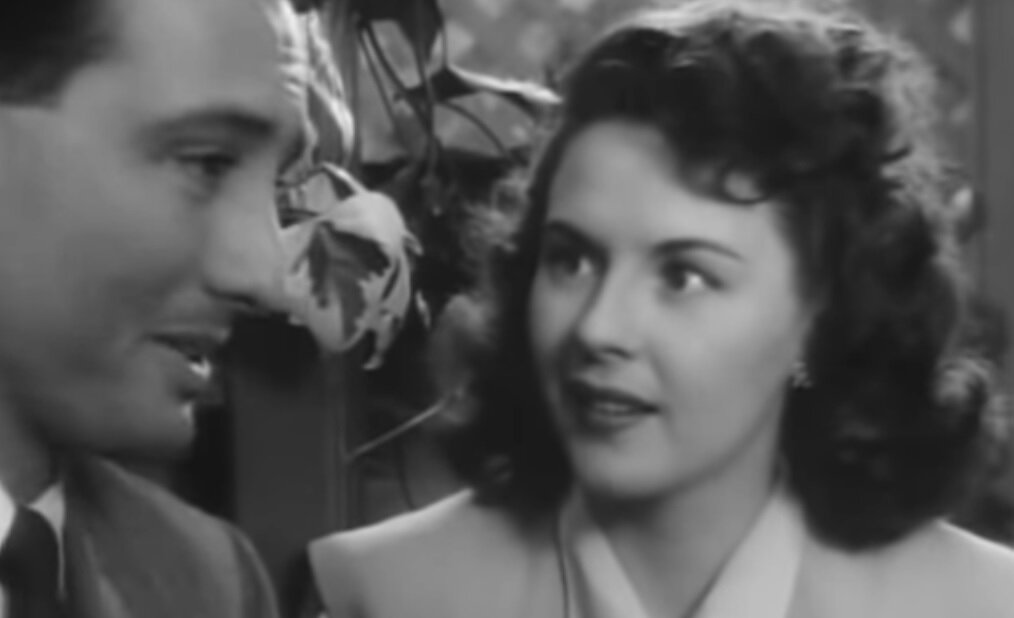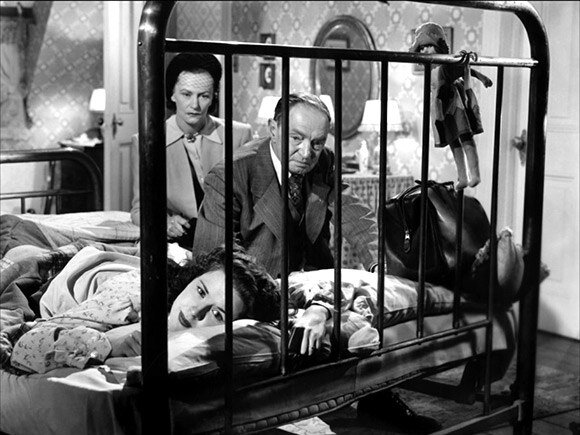IMDB
By Andrea Thompson
If you want a female director to celebrate for #Noirvember, Ida Lupino is pretty much the go to. She wasn't just the main female director working at a time when noir films were at their height, she was pretty much the only one. And while her other films such as “The Hitch-Hiker” are far more well-known, it's the underseen “Outrage” that feels as disturbingly relevant now as when it was made in 1950.
Its beginning is a common one for noir, with a woman alternately staggering and running through a lonely street at night. She's clearly been through the ringer, and we immediately wonder what she's trying to escape. A pursuer? Is this the aftermath of a terrible crime? Or is she suffering from something more existential, like the past she thought she left behind? Is she a woman on the wrong side of the law, a player who got outplayed? Did she set a plan in motion that spun out of her control?
Turns out it's something simultaneously far simpler and complex. Ann Walton (Mala Powers) isn't a noir dame who walked into a bar with a plan and eye for her next mark. She's a happy, ordinary young woman with a loving fiance, Jim (Robert Clarke) a supportive, close-knit family, and a steady job with coworkers she likes and gets along with. Even the guy who serves food at the counter and frequently gives her attention she doesn't want doesn't disturb her. What “Outrage” does as it follows Ann's struggles is offer up a critique for something the film didn't have the words for, and were prevented from even naming, what we now call rape culture.
Screenshot
Because that creepy counter guy that Ann barely notices follows her home one night when she's working late and rapes her. Not that the movie is allowed to say it, instead using using the word assault or attack to describe the horrifying sequence where Ann's unnamed rapist follows her throughout the dark, deserted streets as she desperately tries to call for help from various sources while attempting to evade him. When she collapses from running, the final tragic accident is a car horn which covers her implied screams, as well as a man who hears the horn but unable to see what is happening from his angle.
When Ann returns home disheveled, “Outrage” chooses empathy rather than revenge, as not only Ann but her family grapples with the aftermath of her attack. In “Lucky,” the memoir of her own rape, author Alice Sebold wrote how she learned that, “no one – females included – knew what to do with a rape victim,” and even Ann's loving parents are unsure of what to say to their daughter.
Nor does their community. How everyone learns of Ann's rape is left unsaid, but it's made very clear that they do. The students in Ann's father's class and the other teachers stare at him. More disturbing is how men try to be well-meaning and kind, patting her comfortingly, but the women mostly keep their distance as they stare and whisper. No wonder that when Ann attempts to go back to work, small noises quickly overwhelm her. After such silence, even the softest sounds are deafening to her, and the film doesn't so much as portray her mindset but embed us in it as we share Ann's pain and deterioration.
IMDB
The situation with her fiance also doesn't help. Jim still wants to marry Ann, but only on his terms. When he says he wants to tie the knot the upcoming weekend, she stares at him with a repulsion and horror modern audiences may not be able to fully grasp. Marriage didn't just mean sex, it meant a husband could legally demand it anytime he wished, marital rape not yet being illegal. When Ann refuses, Jim shakes her and tells her to shut up. She responds, “I don't want to get married, ever. I don't want you to touch me. Everything's dirty, filthy and dirty.” Shortly thereafter, she runs away from home and finds herself on an orange picking farm.
In “Outrage,” it isn't only Ann's rapist who feels he has a right to her body. Every man in the film is entitled is his own way, even the saintly Rev. Bruce Ferguson (Tod Andrews), who takes Ann in and helps her get work as a bookkeeper on the farm. But when's Ann's past rears its ugly head, he only takes her side up to a point. At a dance, a man comes up and keeps following Ann, touching her, and insisting after she repeatedly says no. It brings up memories of her trauma, so Ann hits him with a wrench, severely injuring him. But since he has a reputation as a good guy, he's given a pass for his creepy behavior and it's Ann who is blamed. Bruce never even asks if the man made her uncomfortable, even if he's eventually able to understand and empathize with her actions.
As Ann awaits judgment, she murmurs, “Maybe I am crazy. Sometimes I feel as if the whole world is upside down.” Even if “Outrage” can't quite fully grasp what exactly makes her world seem so backwards, it can hardly be faulted for failing to realize something we're still struggling to understand today. At least the film urges reform rather than punishment, not just for Ann, but for the man who raped her, who was caught and revealed to have spent half his life in reform schools and prisons without being identified or treated as a “sick individual.” Through Bruce, “Outrage” ends up advocating not just for compassion, but for more hospitals and clinics rather than prisons.
IMDB
As a result, Ann is not charged, but rather ordered to undergo outpatient treatment rather than sentenced to imprisonment or institutionalization. At Bruce's encouragement, she eventually stops running and goes back to the life she left behind. As she departs, “Outrage” optimistically imagines a happy future for Ann, one that is not defined by the trauma she endured. Even if it seems a bit too bright of an ending, it's one that's well-earned, and more than other movies seem to expect from women who have similar experiences.





